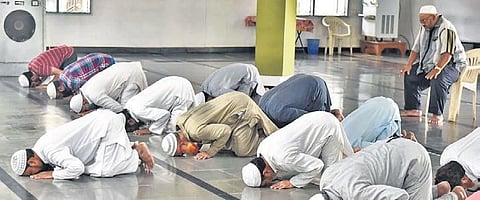

LUCKNOW: The Islamic seminaries in Uttar Pradesh are divied over the use of alcohol-based sanitizers to clean the mosques. While a Bareilly-based cleric, associated with Ala Hazrat Dargah, issued a fatwa against the use of alcohol-based sanitizer to clean the mosques, Deoband-based prominent Islamic seminary Darul Uloom found no harm in its use to tame the coronavirus.
The standard operating procedures (SOPs) issued by government prescribes use alcohol-based hand sanitizers besides practising physical distancing of at least six feet, using face cover/mask, washing hands frequently with soaps for at least 40-60 seconds and covering mouth and nose while sneezing or coughing.
As per the sources, Nashtar Farooqi, Mufti Markazi Darul Ifta, Dargah-e-Ala Hazrat, Bareilly, has come out against the use of alcohol-based sanitizers as he claimed that alcohol content was ‘haraam’ (prohibited) in Islam and Muslims should avoid it. Muslims should not bring it or use it inside mosques as it was ‘napaak’ (impure).
Markazi Darul Ifta is a department of the Islamic seminary which issues fatwa. As per Farooqui, anything the use of which is ‘haraam’ in Islam, how its use in mosques as sanitizer with over 70 per cent alcohol be justified. He said the mosque was a ‘paak’ (pure) place and usage of alcohol-based sanitizers would make the place impure.
The cleric allegedly argued that since alcohol was declared impure, offering namaz with anything impure in the vicinity was not allowed in Islam. He claimed religious leaders of other communities too had objected to the usage of alcohol at religious places.
Significantly, the clerics of Saharanpur-based Deoband Darul Uloom, the biggest Islamic seminary in Asia, have come out in support of the use of alcohol-based sanitizers during an unprecedented situation like Covid-19 pandemic.
“It is an unprecedented situation when a pandemic COVID-19 has taken the entire world in its grip. The use of alcohol-based sanitizers during such unprecedented situation was logical as it would help save lives,” said seminary’s spokesperson Ashraf Usmani while taking to media persons.
He said the alcohol was also processed from vegetables and fruits and the Islamic seminary supported its usage to protect the lives of people. He reasoned out by saying that there were a number of alcohol-based medicines consumed for good health.
According to experts, alcohol-based sanitizers are effective and convenient way of keeping the hands free from virus. “Any sanitizer with at least 60 per cent alcohol is suitable to keep hands free from virus,” said Dr Sunil Verma, a senior physician.
However, coming strongly against those who have been objecting to the use of sanitizer in mosques, former chairman of Shia Central Waqf Board, Waseem Rizvi, favoured sanitization of mosques with alcohol-based sanitizers.
“Scientifically speaking alcohol-based hand sanitizer is a good deterrent against any germ or virus. Such superstitions and wrong interpretation of Islam was more dangerous than any virus,” said Rizvi.